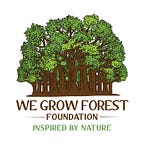RESTORING GREEN: A SUCCESS STORY IN KENYA
The world is under constant pressure. The population is growing, urbanisation is at its peak, and resources are on the verge of exhaustion. This constant pressure has led to deforestation and changes in land-use patterns, making the land less productive. The constant wash off of the topsoil and lack of ability to hold moisture lead to land degradation. Land degradation is one of the severe challenges faced by communities around the globe as it affects humans, wildlife, and livestock and is worsened by climate change.
The primary human contributions to land degradation are changes in land use and unsustainable land management practices, especially in the agriculture and livestock sectors. The situation was no different in the rangelands around Kuku, Kenya. The Kuku rangelands are home to more than 29,000 individuals who primarily belong to the Massai community. They use the lands for grazing their cattle and depend on the forests for most of their daily needs. This area is also a wildlife corridor between the Tsavo West National Park and Amboseli National park, home to Lions, Elephants, Leopards, Giraffes and Zebras. But deforestation and overuse of resources turn the land into open arid stretches, allowing rainwater runoff and soil erosion. This was accelerated by the extreme wet and dry spells experienced by the region during 2017 and 2018.
Many believe that our planet is beyond recovery. But Justdiggit, a Duch NGO, along with the local Massai community and local partner Massai Wilderness Conservation Trust (MWCT), is showing the world the way forward. Their simple and cost-effective solutions help regreen the degraded land and cool the surrounding areas.
The regreening efforts had three main components: bunds, stone lines and grass seed banks. The solutions start with simply digging semi-circular holes called bunds in the ground. Bunds are 2.5 meters long and 5 meters wide in a sloping manner. The closed side of the bund is directed downhill. These holes will collect rainwater and prevent overland flow and erosion.
The collected rainwater will be infiltrated into the soil, recharging aquifers and groundwater. This will also improve the soil moisture giving the vegetation to grow back and, in the long term, improve the soil fertility and cooling the surrounding areas. These pockets of vegetation will act as bunds allowing more water to be infiltrated. Eventually, the vegetation starts overflowing the bunds, spreading into surrounding areas, further increasing the infiltration rates. More than 150,000 bunds have been dug in collaboration with the local communities.
Following the creation of bunds, in areas where stones are available, a stone line was created. These are stretches of stone arranged into lines. These stone lines acted as a wall breaking the erosive forces, increasing the infiltration rate and providing seeds time to germinate and regreen the areas.
Justdiggit has also initiated five grass seed banks where Massai women grow, harvest and sell grass and seeds. The hay (grass) harvested by the Massai women is sold in the local markets as cattle folders. The seeds collected are either sold in the local markets or sold to other regreening projects. This has improved the lives of the communities by providing them with an additional source of income, ensuring food security and at the same time creating lush vegetation over barren land. These oases will also act like bunds, collecting rainwater and improving soil fertility. During extreme dry spells, the hay (grass) collected by women can be used to feed their livestock, ensuring food security.
This simple and grassroots level intervention has helped recover more than 766 hectares of land. On the other hand, helping communities to improve their lives, enhance their income and ensure food security. One of the major highlights of this project is that it did not require any additional planting materials. The regreening project allowed the water to infiltrate, allowing the natural vegetation to take over. Maintaining and managing the ecosystem is vital for maintaining the balance and fighting climate change by sequestering carbon
To know more about We Grow Forest Foundation please visit our website https://wegrowforest.org/ or contact us at on 9778411911 or email at us plant@wegrowforest.org
